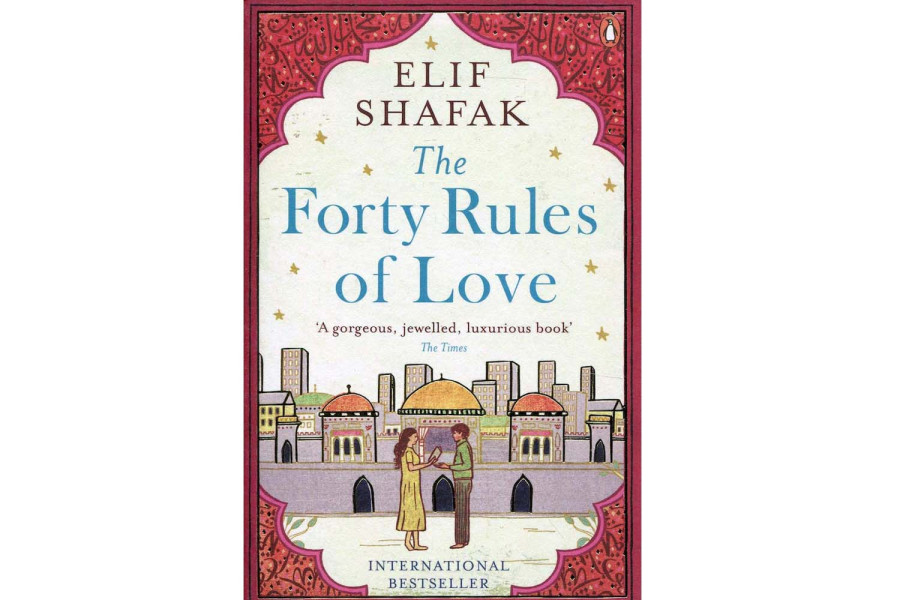Books
Breaking romance norms
‘The Forty Rules of Love’ intertwines spirituality and personal transformation, redefining how we perceive love.
Aarya Chand
My father isn’t a love expert; expressing emotions isn’t his strength. Yet, one childhood conversation with him is stuck with me. I asked him why everything is based on love, noticing it all around—ads, TV shows, movies, and cartoons like Ninja Hattori and Doraemon, where even kids like Kenichi and Nobita showed passion for love.
His response to my question was straightforward yet profound, “Love is the essence of life.” This wasn’t merely an explanation; it was a philosophy that reverberated through the years and resurfaced when I found myself holding a copy of ‘The Forty Rules of Love’ by Elif Shafak.
This book was gifted to me by a close friend who had learned of my scepticism regarding true love. I’ve never felt romantic love; I’ve often questioned its reality. Yet, my friend couldn’t grasp how anyone could live without believing in love. Thus, they gave me the novel, saying, “A life without love is like a life without meaning.”
Opening the book felt like it had chosen me. I approached with curiosity and hesitation, pondering its lessons. As one rule in the book states, “The universe conspires to guide us toward what we need most.” The book wasn’t just about love but about rediscovering life’s essence.
Reading ‘The Forty Rules of Love’ was an engaging journey oscillating between scepticism and awe. At moments, it reminded me of a dramatic, intense Turkish serial filled with emotional depth. However, beneath its recognisable narrative lies an exploration of love that transcends conventional romantic tales.
As I turned each page, I imagined Kailash Kher’s mystical melodies and a serene setting like ‘Kun Faya Kun’. The novel bridges Sufi wisdom with the spirituality I feel in Indian culture. Just as Sufi music speaks to the soul, Shafak’s writing resonates personally, bypassing logic and fostering a deep spiritual connection.
This book isn’t just a story; it’s an experience that gently pushes you toward universal truths about love, life, and the divine. It’s the kind of story that lingers not because of its plot twists or characters but because it resonates on a hard-to-articulate level. For someone who turned its pages with doubt, I came out on the other side with a sense of self-observation and maybe a little more faith in love.
The novel follows Ella Rubenstein, a forty-year-old housewife whose perfect life unravels as she reads a manuscript about Rumi and Shams of Tabriz. As someone who questions love stories, I was drawn to Ella’s transformation, captivated not by romance but by her awakening to life itself.
Shams’s lines, such as “Love is the water of life,” and “A lover is a soul of fire,” resonate as universal truths rather than just poetry. They made me view people differently, seeking the divine light Shams perceived in everyone. This also reminded me of Mere Sai’s compassionate gaze from childhood, which reached beyond appearances, touching souls with warmth and understanding.
Reading the novel, I recalled a scene from ‘Kitni Mohabbat Hai’ that captivated my childhood. The female lead tells the male lead, “I can leave the whole world for one heart; that’s how much I love.” He replies, “I can give my entire life for just one moment; that’s how much I love.” Ingrained in my memory since I was 14, these lines echo the essence of love in Shafak’s novel, where love—romantic, spiritual, or universal—requires surrender, sacrifice, and courage.
For instance, ‘Rule 40’ from the novel states, “A life without love is of no account. Don’t ask yourself what kind of love you should seek, spiritual or material, divine or mundane, Eastern or Western... Divisions only lead to more divisions. Love has no labels, no definitions. It is what it is, pure and simple.” This declaration mirrors the sentiment of the characters in ‘Kitni Mohabbat Hai’, where the lovers give up material attachments (the world, the life) for love’s sake. The willingness to sacrifice “the whole world” or “an entire life” for love reflects the notion in Shafak’s novel that love, in its purest form, is boundless. It demonstrates that everything else becomes secondary, not through loss, but by embracing something far more significant.
Rubinstein, the novel’s protagonist, undergoes a similar intensity. Her bond with Aziz Zahara drives her to abandon her flawless yet unfulfilling existence for the love and spiritual enlightenment he provides. Like the lovers in the Indian drama, Ella discovers that love demands risk, bravery, and the willingness to leave behind the familiar for something transformative.
Aziz’s words summarise this beautifully, “Try not to resist the changes that come your way. Instead, let life live through you. And do not worry that your life is turning upside down. How do you know that the side you are used to is better than the one to come?” Much like the lovers’ conversation in the drama, this sentiment isn’t just about sacrifice; it's about embracing love as a transformative force that breaks and rebuilds the self, leading to profound growth and connection.
The novel focuses on the historical narrative and spiritual bond between Rumi and Shams, which serves as its philosophical backbone. Their relationship illustrates that transformation is central to love. Shafak depicts Rumi’s journey from a respected scholar to a mystic poet, resonating with anyone who desires change, regardless of romantic love experience.
Shams of Tabriz’s forty rules of love, scattered throughout the novel like precious gems, offer wisdom and rules like “The path to the Truth is a labour of the heart, not of the head,” which challenged my intellectual approach to understanding love. As someone who often seeks logical explanations for emotional phenomena, I found these rules unsettling and enlightening. They seemed to ask for a surrender not just of doubt but of the need to rationalise love itself—a surrender that feels liberating and intimidating simultaneously.
The novel’s multiple storylines and voices might be overwhelming, but they serve a crucial purpose. Just as love manifests differently in different hearts, these perspectives also show how divine love uniquely touches each soul. Through characters like Desert Rose, the dancer seeking redemption; Suleiman, the drunk searching for meaning; and Kimya, the scholar yearning for connection, Shafak beautifully illustrates that the path to love, whether divine or human, is never straight. Each story reinforces that the path to love is a labyrinth, its twists and turns as unique as the traveller’s soul.
What makes ‘The Forty Rules of Love’ captivating is its examination of love as a transformative power. In both narratives, love challenges societal norms and personal boundaries. Shafak illustrates that love, at its essence, demands considerable bravery—the bravery to question, to evolve, and, at times, to let go of what is familiar. This concept strikes a chord, particularly for individuals who have experienced being constrained by societal pressures or their self-imposed restrictions.
The parallel between Rumi’s thirteenth-century world and our contemporary society is striking. Both eras grapple with religious fundamentalism, gender roles, and the conflict between spiritual and material values. Through these parallels, Shafak suggests that while times change, the essential human struggle to understand and embrace love remains constant.
At a time when love is often misunderstood as mere romance or possession, ‘The Forty Rules of Love’ remains relevant for its deeper exploration of love as a force of transformation. Its themes of self-discovery, spiritual awakening, and breaking societal norms resonate in a world still grappling with identity, connection, and meaning.
I would rate the novel 3.5 out of 5. The glossary and the final page, Dreaming in English, merit an additional 0.5. This book is undeniably magical and filled with meaningful quotes. If you’re seeking a book to fill your heart with positive energy and a wave of love, this is the one to pick up.
The Forty Rules of Love
Author: Elif Shafak
Publisher: Penguin Books
Year: 2009
Pages: 354




 16.12°C Kathmandu
16.12°C Kathmandu










